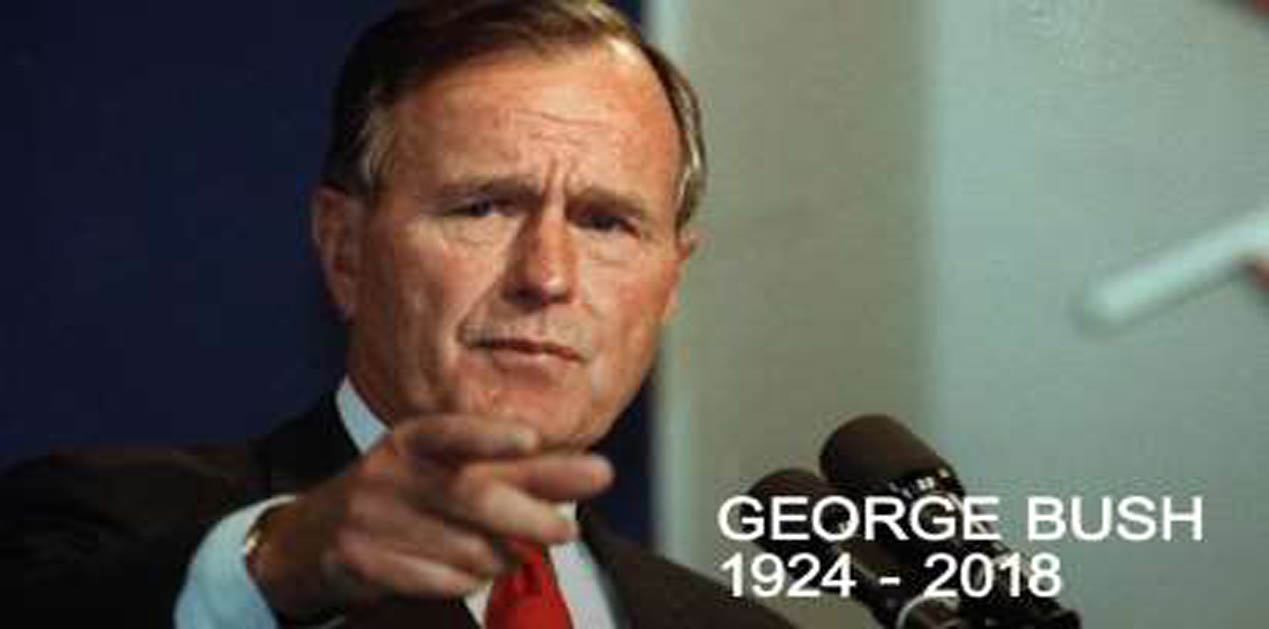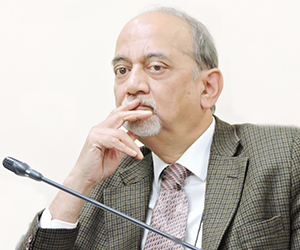George Herbert Walker Bush was the last US President who fought in the Second World War. He also presided over the demise of Cold War. He deftly used multilateralism to advance US national interests. The success of American led coalition in the first Gulf war did not tempt him to attempt regime change. He used American power, but also understood its limits.
Bush came from a patrician background. His father was a banker and a Senator from the East Coast. Bush chose Texas to launch his business, and later political career. Often accused of being a Boston Brahmin, he was not very comfortable with the extreme right wing of the Party. He launched his Presidential bid in New Orleans Convention with the slogan of ‘kinder, gentler America’. However, Bush’s campaign manager Lee Atawater, a hard nosed political consultant, was not always gentle with Bush’s opponent. His campaign tactics were criticized for negative ads against Dukakis. Dukakis had 17 percent lead in the polls, particularly after his Chicago convention. Bush eventually caught up and overtook his rival.
While Reagan accentuated the Cold War rhetoric, Bush managed the thaw in relations with the Soviet Union, and eventual transition to a post-Cold War world skillfully. Bush assumed Presidency after the Intermediate Range Nuclear Forces Treaty (INF Treaty) had already been signed in December 1987. He pushed for a Treaty on Conventional Armed Forces in Europe (CFE). By that time Gorbachev had already begun the process of unilateral withdrawal of troops from Eastern Europe. US acceptance of reduction in conventional forces accelerated the process of Soviet withdrawal.
The success of conventional force reduction depended upon resolving the ‘German Question’. Bush had to convince NATO allies, and the Soviets, that German re-unification would not pose a threat to peace and security in Europe. The CFE Treaty put limits on placement of troops and equipment in Europe, creating confidence for undertaking disarmament. Without draw-down of Soviet forces, it was not possible for freedom movements to succeed in central and eastern Europe. Perhaps, this was more momentous than INF Treaty in changing the political landscape in Europe. The formula agreed for resolving the ‘German question’ was keeping re-united Germany anchored firmly in EU and NATO. This was not easily accepted by UK and France. American acceptance of Soviet proposal for draw-down of forces, and the fall of Berlin Wall presented them with a fait accompli.
Bush faced a different set of challenges in the Middle East with Saddam Hussain’s invasion of Kuwait. It was not certain in the beginning that Saudi Arabia would agree to take a stand. Once Vice President Dick Cheney’s mission had convinced the Saudi leadership, preparations began to put together a ‘Coalition of the Willing’. This was the American led coalition, which would fight under UN mandate. Finance for the war effort was to be provided by the Saudis, the Gulf monarchies and Japan. The issue of ‘burden sharing’ was important, then and now. The Gulf states had to pay for their defence.
Bush used the UN mandate not only to win legitimacy for America’s war effort internationally, but also to nudge US Congress to provide him with authorization to go to war. Bush had to contend with a Congress, where both House and Senate were controlled by Democrats. The UN Security Council resolution 678 (1990) was adopted on 29th November 1990 by a vote of 12 for, two against and one abstention. Soviet Union voted in support of the resolution, which authorized ‘use of all necessary means’ against Iraq, a traditional Soviet ally. This was an early harvest reaped by US after the end of Cold War. China abstained on condition of trade concessions. Cuba and Yemen voted against.
Congressional authorization for Gulf war was given two months later in January 1991. Both Senate and the House had Democratic majorities. The choice was between continuation of sanctions and war. But both Houses gave bipartisan support to Bush Administration’s call for military action. The vote in the Senate was won by a narrow majority of five votes. 42 Republicans and 10 Democrats voted in favour of the resolution, while two Republicans and 45 Democrats voted against. In the House, the resolution was passed by a comfortable majority of 250 votes for and 183 against. 164 Republicans and 86 Democrats voted in support of the resolution, while 3 Republicans and 179 Democrats voted against. One member abstained. Multilateralism and national agenda were not seen as opposing forces; the former facilitated the latter.
Bush lost 1992 election to relatively unknown challenger from Arkansas. His defeat is often attributed to his breaking the promise ‘Read my lips: No new Taxes.’ Having made the pledge, he had little room to maneuver. Budget process is dominated by Congress. Republicans were in minority both in House and Senate. Bush lost to Clinton by a vote of 43.0 percent to 37.4 percent. While economy played a part, Ross Pero chipped away the Republican base with 18.9 percent votes.
The new world order inaugurated after the demise of Cold War has given way to a more complex world. Russia has re-emerged as a major power. More striking is the rise of China. There are other players, including Japan, India and Brazil. Germany’s role within EU will be further accentuated in case of Brexit. This together with the fate of INF Treaty will re-open old equations. Gulf is more fragmented; Bush Junior did not follow his father’s restrain. 9/11 brought back a Super Power to Afghanistan, this time United States. US has since decided to withdraw from the country, while post-war power structure remains uncertain.
The Gulf War was a turning point in Indo-US relations. India joined the UN Security Council as a non-permanent member in 1991, and voted in support of UN Security Council resolution 687. The resolution decided the structure of post-war Iraq. When Rajiv Gandhi was assassinated, President Bush personally came to the Indian Mission to sign the condolence book. This was a rare gesture considering India’s initial position during Iraq war, and the fact that Rajiv Gandhi was no longer Prime Minister.
(The author served in Indian Mission in Washington during Bush Presidency)
Image Source: https://img-s-msn-com.akamaized.net/tenant/amp/entityid/BBQksI2.img?m=1&b=black&w=412&h=232&f=jpeg&q=60











Post new comment